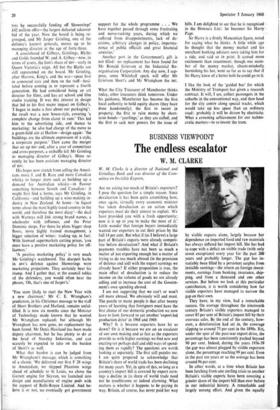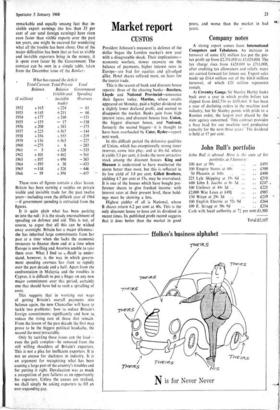The endless escalator
BUSINESS VIEWPOINT
W. M. CLARKE
W. M. Clarke is a director of National and Grindlays Bank and was director of the Com- mittee on Invisible Exports.
Are we asking too much of Britain's exporters? I pose the question for a simple reason. Since devaluation it has been quite astonishing how, once again, virtually every economic minister has taken devaluation as an action which exporters must do their utmost to exploit. 'We have provided you with a fresh opportunity; now it is up to you to make the most of it.' Little wonder that foreign buyers immediately wanted our exporters to cut their prices by the full 14 per cent. But what if (as I believe) a large part of Britain's exports were already competi- tive before devaluation? And what if Britain's payments troubles have not been so much a matter of not exporting enough but a matter of trying to do too much abroad (in the provision of defence and aid) with the export earnings we already have? If either proposition is true, the main effect of devaluation is to reduce the income on the volume of goods we are already selling and to increase the cost of the Govern- ment's own spending abroad.
I am not suggesting that we can't or won't sell more abroad. We obviously will and must. The puzzle to many people is that after twenty years of learning that foreigners must have the first choice of our domestic production we now have to look forward to yet another 'export-led production drive' in 1968 and 1969.
Why? Is it because exporters have let us down? Or is it because we are on an escalator of our own making and as fast as the exporters provide us with higher earnings we find new and exciting (or perhaps dull and old) ways of spend- ing them as rapidly? The questions are worth looking at separately. The first still puzzles me. I am quite prepared to acknowledge that Britain's share of world trade has been declining for many years. Yet, in spite of this, so long as a country's import bill is covered by export earn- ings a decline in its share of world trade need not be troublesome or indeed alarming. What matters is whether it happens to be paying its way. Britain, of course, has never paid her way by visible exports alone, largely because her dependence on imported food and raw materials has always inflated her import bill. She has had to cope with a deficit on visible trade (with only seven- exceptions) every year for the past 200 years and probably longer. The gap has in- variably been filled by a persistent surplus from invisible earnings—the return on foreign invest- ments, earnings from banking, insurance, ship- ping, and from a thousand and one other services. But before we look at this particular contribution, it is worth considering how far visible exporters have managed to narrow the gap on their own.
They have, in my view, had a remarkable success. On average throughout the nineteenth century Britain's visible exporters managed to cover 85 per cent of Britain's import bill by their overseas sales. By the end of the century, how- ever, a deterioration had set in, the coverage slipping to around 75 per cent in the 1890s. Yet, under the spur of the post-war export drive, the percentage has been consistently pushed beyond 90 per cent. Indeed, during the years 1956-59 the gap was almost plugged by visible exporters alone, the percentage reaching 99 per cent. Even in the past ten years or so the average has been around 96 per cent.
In other words, at a time when Britain has been lurching from one sterling crisis to another Britain's visible exports have been covering a greeter share of the import bill than ever before in our industrial history. A remarkable and largely unsung effort. And given the equally
remarkable and equally unsung fact that in- visible export earnings (no less than 35 per cent of our total foreign earnings) have risen even faster than visible exports over the past ten years, one might be excused for wondering what all the trouble has been about. One of the major difficulties has been that as fast as visible and invisible exporters bring in the money, it is spent even faster by the Government. The contrast can be seen in a simple table, taken from the December issue of the Banker: What has caused the deficit Total Current Total Private Total Balance (f million) &twice (visible and invisible trade) Government Spending Overseas 1952 +163 + 224 — 61 1953 +145 +211 — 66 1954 +177 +248 —131 1955 —155 — 17 —138 1956 +208 +383 —175 1957 +223 +367 —144 1958 +336 + 555 —219 1959 +136 +363 — 227 1960 —275 + 8 — 283 1961 — 5 +328 —333 1962 +101 +462 —361 1963 +107 +490 —383 1964 —395 + 38 —433 1965 —118 +328 —446 1966 — 59 + 398 —457 These-rows of figures contain a clear lesson. Britain has been earning a surplus on private visible and invisible trade for the past twelve yeaes—including even the difficult year of 1964 —if government spending is extracted from the figures.
It is quite plain what has been pushing us into the red : it is the steady encroachment of spending on defence and aid. This is not, of course, to argue that all this can he wished away overnight. Britain has a major dilemma: she has inherited large commitments from her past at a time when she lacks the economic resources to finance them and at a time when Europe is unwilling and America unable to take them over. What I find so t..fficult to under- stand, however, is the way in which govern- ment spending overseas has risen so rapidly over the past decade and a half. Apart from the confrontation in Malaysia and the troubles in Cyprus, it is difficult to put a finger on any new major commitment over this period, certainly one that should have led to such a spiralling of costs.
This suggests that in working out ways of getting Britain's overall payments into balance again, the new Chancellor will have to tackle two problems: how to reduce Britain's foreign commitments significantly and how to„ reduce the rising cost of those that remain. From the lesson of the past decade the first may prove to be the biggest political headache, the second the most intractable.
Only by tackling these issues can the load— even the guilt complex—be removed from _the still willing shoulders of Britain's exporters.
This is not a plea for inefficient exporters. It is not an excuse for slackness in industry. It is an argument for recognising what has been causing a large part of the country's troubles and for putting it right. Devaluation was as much a...recognition of past failures as an opportunity for exporters. Unless the causes are realised, we- shall simply be asking, exporters to fill an ever-expanding gap.



































 Previous page
Previous page